How to levitate a magnet with no batteries, external power, or trickery. It floats on pure SCIENCE!Below are some links you can use to purchase bismuth and…
Category: energy – Page 99
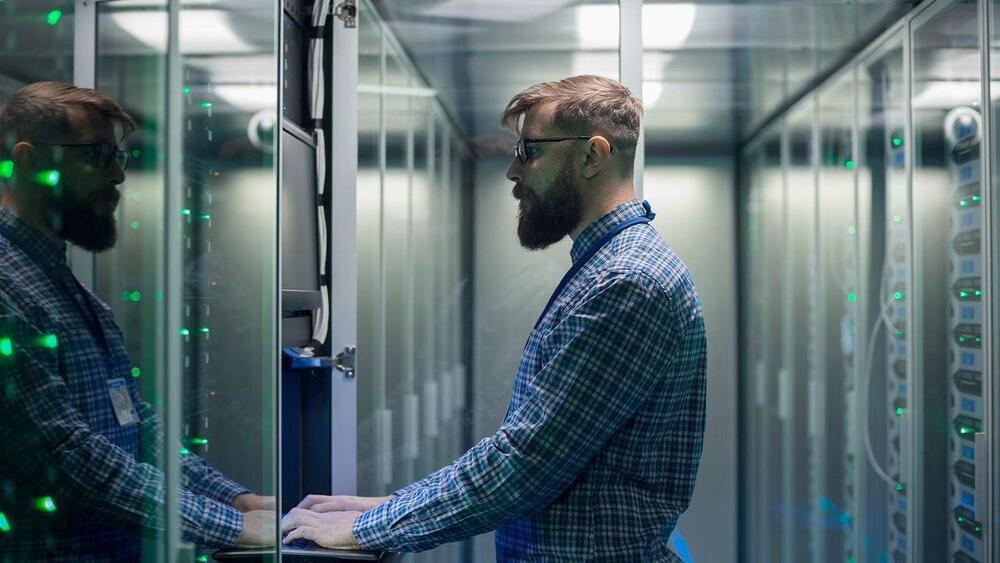
Google and Microsoft consume more power than some countries
In 2023, Google and Microsoft each consumed 24 TWh of electricity, surpassing the consumption of over 100 nations, including places like Iceland, Ghana, and Tunisia, according to an analysis by Michael Thomas. While massive energy usage means a substantial environmental impact for these tech giants, it should be noted that Google and Microsoft also generate more money than many countries. Furthermore, companies like Intel, Google, and Microsoft lead renewable energy adoption within the industry.
Detailed analysis reveals that Google’s and Microsoft’s electricity consumption — 24 TWh in 2023 — equals the power consumption of Azerbaijan (a nation of 10.14 million) and is higher than that of several other countries. For instance, Iceland, Ghana, the Dominican Republic, and Tunisia each consumed 19 TWh, while Jordan consumed 20 TWh. Of course, some countries consume more power than Google and Microsoft. For example, Slovakia, a country with 5.4 million inhabitants, consumes 26 TWh.


Northrop Grumman Builds XRQ-73 SHEPARD Hybrid Electric Uncrewed X-Plane for DARPA
Northrop Grumman Corporation (NYSE: NOC) has announced the design and construction of the Series Hybrid Electric Propulsion AiRcraft Demonstration (SHEPARD) vehicle. The uncrewed air system developed for DARPA recently received its official X-plane designation of XRQ-73. Built in collaboration with Scaled Composites, a Northrop Grumman subsidiary, the XRQ-73 SHEPARD is a DARPA “X-prime” program leveraging hybrid electric architecture and component technologies to quickly mature a new mission-focused aircraft design with propulsion architecture and power class for the Department of Defense.
“The idea behind a DARPA X-prime program is to take emerging technologies and burn down system-level integration risks to quickly mature a new missionized long endurance aircraft design that can be fielded quickly. The SHEPARD program is maturing a specific propulsion architecture and power class as an exemplar of potential benefits for the Department of Defense,” said Steve Komadina, SHEPARD program manager.
The DARPA team includes members from the Air Force Research Laboratory (AFRL), the Office of Naval Research (ONR), and warfighters. The prime contractor for SHEPARD is Northrop Grumman Corporation’s Aeronautics Systems sector in Redondo Beach, CA. Scaled Composites, LLC is a major supplier, along with Cornerstone Research Group, Inc., Brayton Energy, LLC, PC Krause and Associates, and EaglePicher Technologies, LLC. The XRQ-73 aircraft hybrid-electric uncrewed aircraft system (UAS) will be a Group 3 UAS weighing approximately 1,250 pounds. First flight of the XRQ-73 is expected by year-end 2024.

US Army Selects RCADE to Solve Highly Complex Problems Across Domains
Raytheon, an RTX (NYSE: RTX) business, has been awarded a contract from the U.S. Army Futures Command (AFC) Futures and Concepts Center (FCC) to conduct theater level concept experimentation and mission analysis to support agile learning of the future battlefield. Under the contract, a Raytheon team will use its Rapid Campaign Analysis and Demonstration Environment, known as RCADE, to develop large-scale theater scenarios to help FCC leaders assess concepts of operations in a multi-domain conflict. Quantitative data and findings from the scenarios will help identify capabilities needed to succeed in future conflicts.
RCADE is part of Raytheon’s integrated ecosystem of modeling and simulation capabilities that are fed by real-world analytics, models, and data. It creates an experimentation environment where customers can explore battlefield scenarios, assess how different variables impact mission outcomes and quickly iterate their options with greater speed. In tandem with RCADE, the technical expertise provided by Raytheon engineers will complement the U.S. Army’s analysis enterprise. They will work together to meet the challenge of the future and solve complex evolving threats.
“RCADE helps our customers look at some of the most difficult missions and evaluate how to change the outcome for the positive. Our team of highly trained experts power this groundbreaking capability, enabling it to deliver credible, unbiased solutions,” said Colin Whelan, president of Advanced Technology at Raytheon.
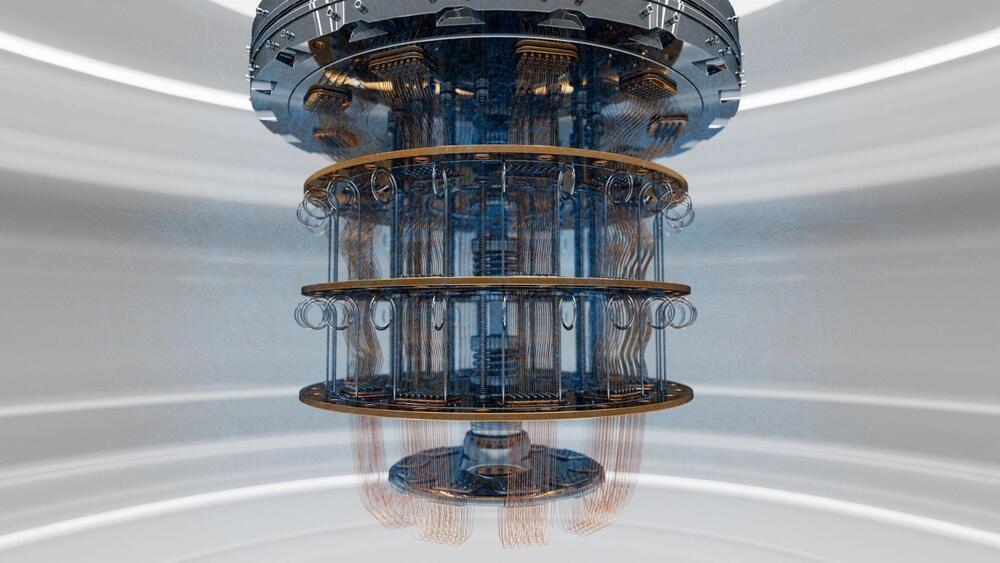
China: Quantum tech cracks subatomic code, beats supercomputers
A Chinese research team has achieved a significant milestone in quantum computing by successfully building a device that can simulate the movement of electrons within a solid-state material.
This research, published in the journal Nature, showcases the potential of quantum computers to surpass even the most powerful supercomputers.
Understanding electron behavior is crucial for scientific advancements, particularly in the fields of magnetism and high-temperature superconducting materials. These materials could revolutionize electricity transmission and transportation, leading to significant energy savings and technological progress.

Starlink Mini is now widely available and doesn’t need a residential subscription
You can now get a Starlink Mini in the US, wherever you are and even if you’re not paying for a residential subscription. SpaceX started offering select users the new Starlink dish model that’s small enough to fit in a backpack in late June. Despite its small size that makes it easy to transport and carry around, the Mini used to require an existing $150 standard service plan — you could only tack on the Mini Roam service for an additional fee of $30 a month. Now, you can get it on its own with a roaming service.
The mobile regional plan costs $150 a month and will give you access to unlimited data. It’s probably the better option if you live in an RV or travel to remote locations for extended periods of time. Meanwhile, the Mini Roam plan costs $50 a month and will give you access to 50GB of data, which is likely enough if you don’t live on the road full time. Take note that you can use Mini Roam in motion anytime, as long as you’re on land. The mobile regional plan has limited in-motion use and only works when you’re going slower than 10mph, though you can choose to add data meant for in-motion use on a per-GB basis.
Like Starlink’s other terminals, you’ll have to pay for the Mini up front. It will cost you $599 for the kit, which includes a kickstand, a pipe adapter, a power supply and a cord with a USB-C connector on one end and a barrel jack on the other. (As The Verge notes, you can plug it into a 100W USB-PD power bank if you don’t have access to other power sources.) There’s no Wi-Fi router with the kit, because it’s already integrated into the dish, giving you one less component to carry.
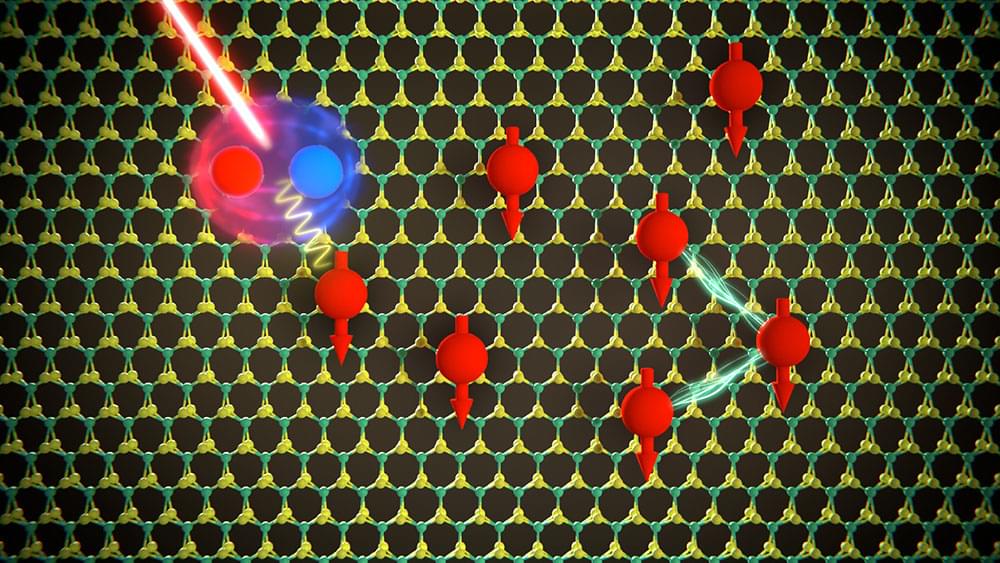
New method for determining the exchange energy of 2D materials
Ferromagnetism is an important physical phenomenon that plays a key role in many technologies. It is well-known that metals such as iron, cobalt and nickel are magnetic at room temperature because their electron spins are aligned in parallel — and it is only at very high temperatures that these materials lose their magnetic properties.
Researchers led by Professor Richard Warburton of the Department of Physics and the Swiss Nanoscience Institute of the University of Basel have shown that molybdenum disulfide also exhibits ferromagnetic properties under certain conditions. When subjected to low temperatures and an external magnetic field, the electron spins in this material all point in the same direction.
In their latest study, published in the journal Physical Review Letters (“Exchange energy of the ferromagnetic electronic ground state in a monolayer semiconductor”), the researchers determined how much energy it takes to flip an individual electron spin within this ferromagnetic state. This “exchange energy” is significant because it describes the stability of the ferromagnetism.
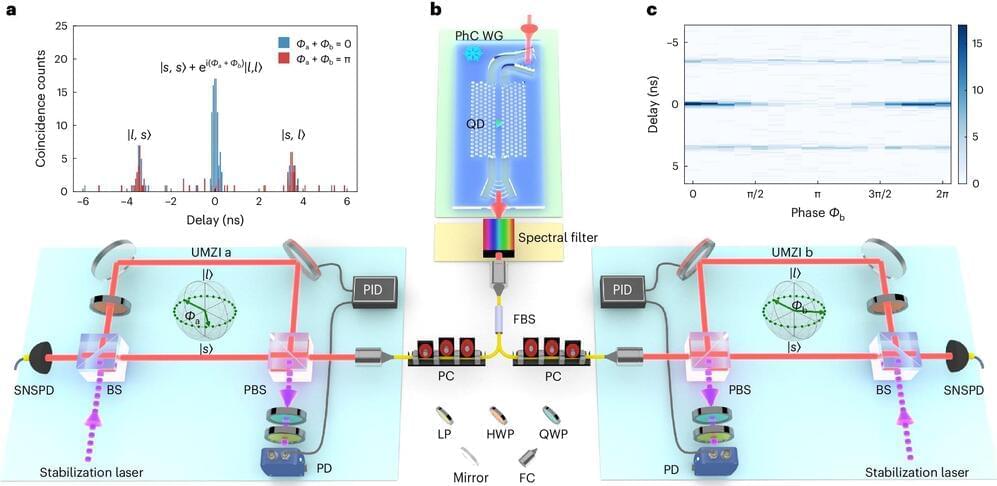
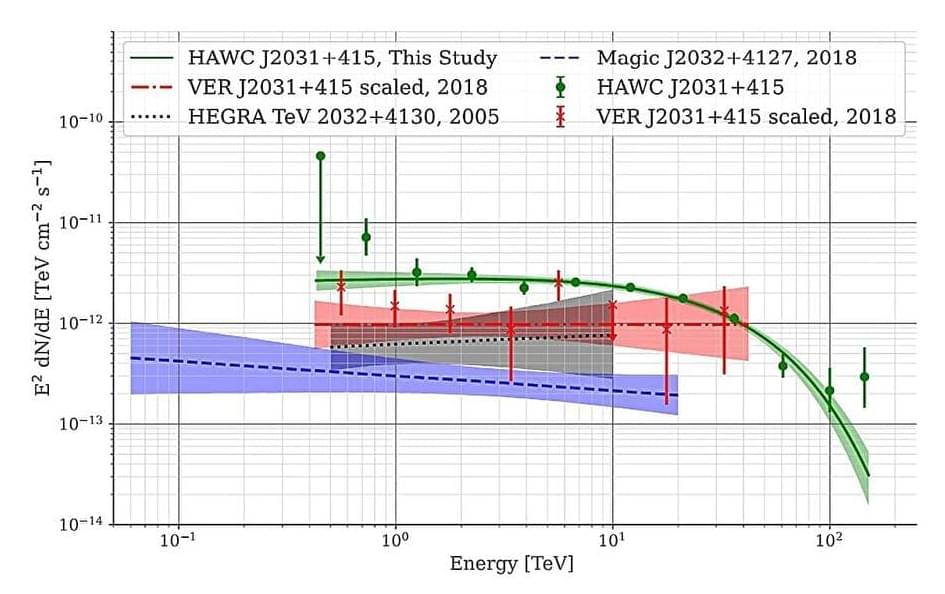
Study investigates the nature of very-high energy gamma-ray source TeV J2032+4130
Using the High-Altitude Water Cherenkov (HAWC) observatory, an international team of astronomers has observed a very-high energy gamma-ray source designated TeV J2032+4130. Results of the observational campaign, presented July 3 on the preprint server arXiv, provide crucial information regarding the nature of this source.
Sources emitting gamma radiation with photon energies between 100 GeV and 100 TeV are called very-high energy (VHE) gamma-ray sources, while those with photon energies above 0.1 PeV are known as ultra-high energy (UHE) gamma-ray sources. The nature of these sources is still not well understood; therefore, astronomers are constantly searching for new objects of this type to characterize them, which could shed more light on their properties in general.
TeV J2032+4130 was identified in 2005 by the High Energy Gamma Ray Astronomy (HEGRA) experiment as the first VHE gamma-ray source in the TeV range with no lower-energy counterpart. Previous observations of TeV J2032+4130 have revealed that it consists of two sources, namely HAWC J2030+409 and HAWC J2031+415, which is coincident with a pulsar wind nebula (PWN).